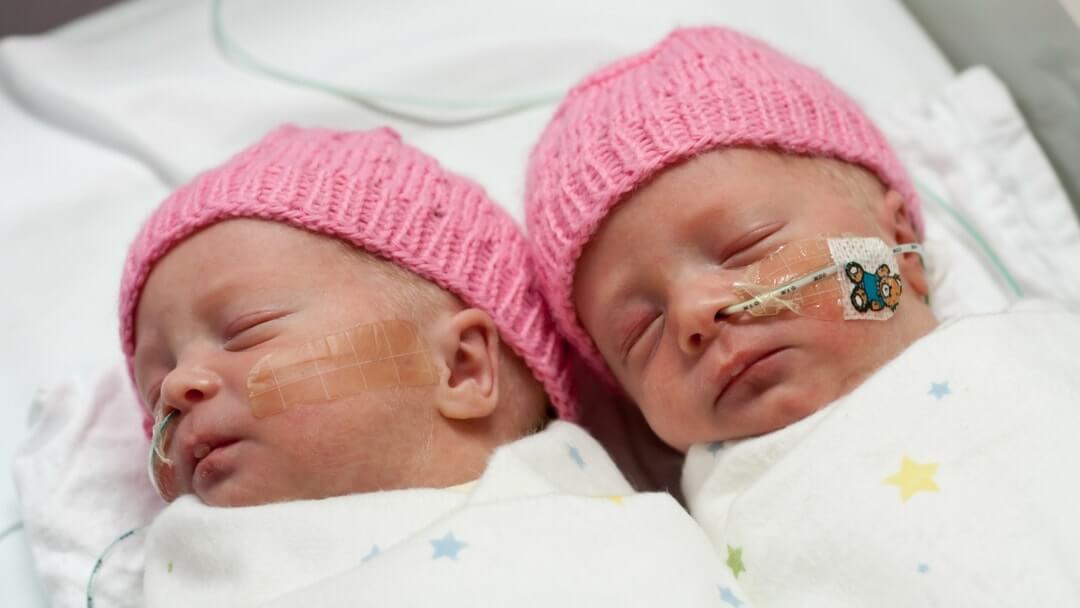When you’re finally told that your NICU stay is coming to an end and you’ll be allowed to take your precious premature twins or triplets home, it’s hard to not have mixed feelings.
On the one hand, it’s what you have been waiting for since your babies went into NICU. But it’s normal to freak out a little bit too. Suddenly you won’t have a whole team of doctors and nurses caring for your babies and it’ll just be you (plus your support people).
But before you pack your wee ones into the car and drive off into the sunset, you’ll have plenty of time to talk with the NICU nurses to help you to prepare for the move. Many hospitals have a homecare team that is tasked with helping new parents to make this often huge transition home.
The Homecare team, together with doctors and other health professionals (such as a lactation specialist if there are any feeding issues), help you get a realistic idea of what looking after two or more babies will be like. The team will help parents work out how to manage at home including how often will they sleep. How often they will need to be fed and if mum will also have to pump?
Once the babies go home some families may have visits from the Homecare team (all NICU nurses). This is to check the baby’s growth and feeding and to make sure everyone is settling in ok. If everything is going well they hand over to a midwife or doctor to make sure the family is well looked after.
Preparing for the Babies Arrival
There are a few things premature twin parents are encouraged to look out for when they’re getting their home ready for the new family members.
It is recommended that premature twins have separate beds, ideally their own bassinets in the parents’ bedroom.
It’s also important to have babies’ clothes and bedding made from natural products like merino, cotton or wool. Babies covered in polar fleece or other synthetic material can easily overheat.
In NICU most babies’ vital functions are continuously monitored, and when these monitors are removed it can be a bit frightening for the parents. The monitors come off in hospital as soon as they’re not needed so that the parents can get used to having their babies in cots without any wires attached to them before they take their babies home.
A small percentage of babies will go home with a monitor, and those parents will get special training. But most parents will learn to trust themselves and watch their babies carefully.
It’s only natural to be a bit nervous, and many parents wonder if they should buy baby movement monitors for their twins. If a monitor is required for a clinical reason the unit will issue one. If the baby does not require clinical monitoring at home the parents may choose to buy a monitor for parental reassurance.
How to Get the Babies Home
A lot of premature twins are still very small when they go home, much smaller than full-term newborns, and they don’t fit into standard car capsules. And there aren’t any car seats made especially for preemies.
Of course, that doesn’t mean the wee ones have to go home without being safely and comfortably strapped into a standard car seat.
Ask the NICU staff to show you how to position your precious wee ones in the capsule with the help of some cloth nappies to make sure they’re safe in the car.
And finally, before bringing the babies home, make sure the freezer is stocked as full as possible with ready to heat and eat meals as you will be busy.
Make a plan of how you will manage your days. Get support from friends or family, but at the same time make sure that everyone who comes into contact with your little ones is healthy.
In an ideal world we want the babies to be as protected as possible and not exposed to unnecessary outings, such as school runs and so on. But in the real world that’s not always possible so it’s important to keep them warm (in natural fabrics), use buggy rain covers and be sensible.
Twin parents should be prepared to be very tired for the first while at home with their babies.
You’ll be getting up a lot to feed and it can be a good idea to limit visitors for a while. Some people don’t tell their extended family and friends when they go home from NICU so that they can settle in properly and feel ready to deal with visitors.
Although many parents are over the moon that they finally can take their babies home and want to show them off to everyone, be aware that over-handled babies don’t settle well or feed well.
Despite all the advice, the first couple of months can be overwhelming. So if you find that you’re struggling with your multiples make sure to reach out for help


